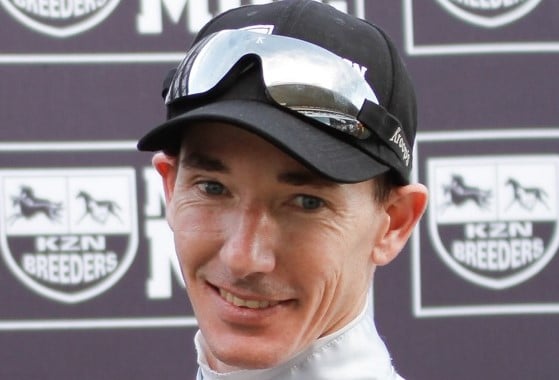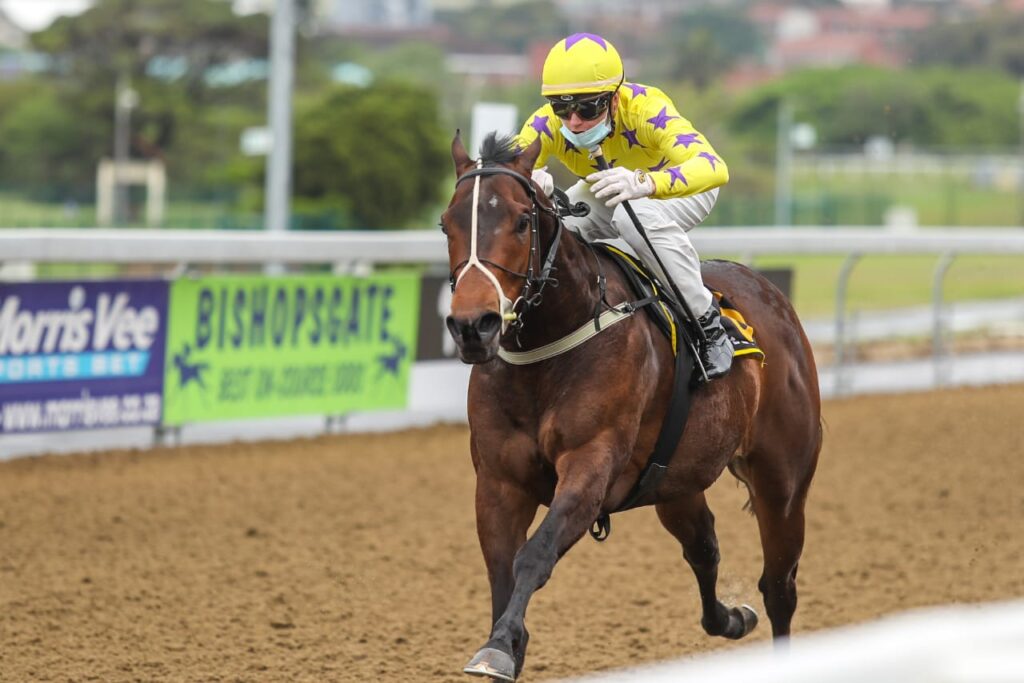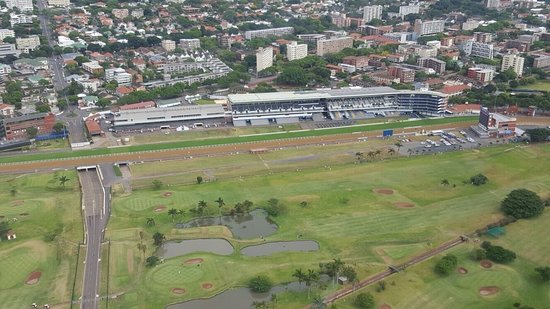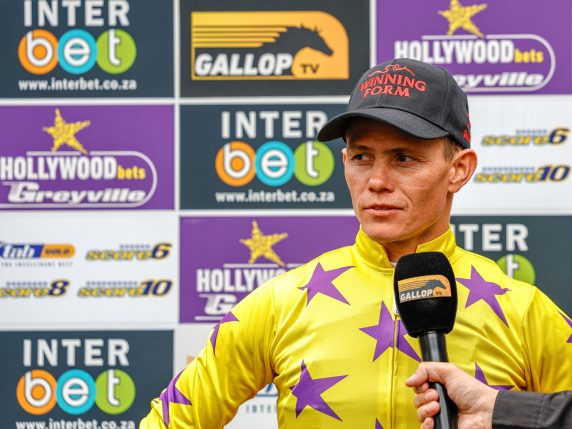The senior jockeys are clearly just not hungry enough. One would have thought that after the trauma of lockdown and the dire straits racing finds itself in, they’d all have been champing at the bit.
That was the word from senior KZN trainers, former jockeys themselves, who said that they were shocked and disappointed that a small group of riders in KZN appeared to be holding ‘the whole lot to ransom’.

SA Champion Jockey Warren Kennedy – refutes suggestions of senior pressure (Pic – Candiese Lenferna)
But on the flipside of the coin, SA Champion jockey Warren Kennedy, speaking in his capacity as Provincial Representative of the Coastal Jockeys Association, has indicated that the decision by his colleagues to lodge a protest on Sunday had been by a majority consensus – ‘not a small group of seniors’.
This came after Sunday’s Hollywoodbets Greyville racemeeting was consigned to the scrapheap after just one race, following a jockey protest.
It was labelled a ‘hijacking of the game’ by one trainer, but Kennedy refuted that saying that it was a naturally emotive and difficult issue and that the jockeys needed to ride to earn a living.
“We are not living and working in a bubble. Many jockeys came under as much pressure as anybody else during the trying lockdown months and racing is our bread and butter too. We want to race. We understand the pressure on the industry – on owners, trainers and the racing operators,” said the recently crowned SA Champion.
The first race on Sunday was won by the Hollywoodbets Syndicate-owned Spyda’s Corner.

The only winner at Hollywoodbets Greyville on Sunday – Luke Ferraris and Spydas Corner (Pic – Candiese Lenferna)
“There was not even a minor incident in the first – not a horse pecked, there was nothing of consequence. Yet some jockeys came back saying it was dangerous,” said one trainer.
He conceded that the track ‘was not perfect’ after three days of rain – ‘it didn’t look pretty’ – but it wasn’t dangerous. He added that the water often collected at the 1200m and 800m on the lower parts of the track. This was ‘historical’.
He said that the irony was that it was unlikely that any of the jockeys present on Sunday had ever ridden on a ‘dangerous’ track.
Kennedy said that it made no sense to achieve the ultimate confirmation of a ‘dangerous’ track via an accident that could maim or kill a horse or rider.
“We love our horses and we all have families and loved ones. We understand it is a dangerous occupation. We don’t want any role-player to be injured. If the majority feel it’s dangerous then we must lodge the protest.”
The trainers also emphasised that trainers and owners would not want to hurt their horses by exposing them to danger – that was ‘unthinkable’.
The track was examined after the first race on Sunday and as a precaution the Stipes asked the jockeys to keep wide.

Kennedy said this proviso included some ‘difficult protocols’.
A senior trainer disagreed with the Stipes that it was even necessary to get the jockeys to run wide.
“This request by the Stipes was not even necessary. Yes there was water – but it was clear water and there was no give in the ground,” added another senior trainer who said that it may not be the most pleasant of conditions, but that jockeys were sportsmen in a no holds barred competitive game and not babies wrapped in cotton wool.
He recalled that in years past, there would be an all-parties track inspection and the stewards – not the jockeys – would decree that racing would go on race by race.
“In those days we raced through pouring rain and muddy water patches. The base in the Cape is sandy so there was no danger of slipping – but let’s say a venue like Hollywoodbets Scottsville could be dangerous as the soil is clay. But we are talking about an all-weather poly surface here. The Hollywoodbets Greyville Track Manager took a hoe and went down 8 inches. The soil was bone dry!”
It was pointed out that in the USA racing goes ahead on sand with sloppy pools of water everywhere.
“Our local jockeys could never ride in England either. The tracks are cambered, they are uphill and downhill, and there is often water everywhere. Here we have a straightforward hard surface and they cry off because it’s deemed dangerous. One can only wonder if they actually have it a bit too easy. In my day the Academy was a hard grounding and we’d never consider hijacking racing. We respected owners, trainers and the racing public. We were unselfish bit players on the stage then. It seems the jockeys now consider themselves the stars of the show. At the same time, there is as good core of hardworking guys here who realise that the financially more stable senior jockeys are certainly not going to pay their bonds and HP’s at the end of this month.”
A suggestion was made that a committee be formed of two trainers, two jockeys, two NHRA officials and a Vet.
“We then stick to what the committee decides by majority. We won’t have comfortable individuals pulling the plug on it just because it’s more comfortable elsewhere..”
It seems that the leading determinant is – what is dangerous?
Is it wrong for NON RIDERS to force RIDERS to operate when they (the riders) deem it ‘too dangerous’?
Recently retired top riders like Garth Puller, Andrew Fortune and Gavin Van Zyl are adamant that conditions were not ideal – but not suicidal, either. They are veterans in an admittedly dangerous profession, and are very unlikely to wish to see former colleagues and current jockeys being endangered
Maybe it’s time that the committee operates on a blind vote and make the decision to stop racing on a majority vote that we can all trust
Individual jockeys should have the right to step down, completely unsanctioned and unpenalized, for any reason, once conditions are such that a vote was called for.
What the Stipes report said:
Prior to the commencement of this race meeting, a track inspection was conducted. In this regard, it was established that certain areas on the inside of the course, in particular between the 800m and the 600m, required further maintenance. This was agreed to by the Track Manager, who undertook to complete same maintenance with the assistance of the Trainer Representative, Mr T Rivalland. This caused a delay to the start of this race meeting.
It was further agreed, in order to facilitate the continuation of the race meeting that, the Riders would race approximately 4 horses wide off the inside running rail which decision was ratified by the Stipendiary Board, in terms of its Powers granted in Rules 4.2.18 and 72.1.40.
After the running of this Race, the Riders raised further concerns regarding the going of the track. In this regard, it was established by the Riders whilst riding in the Race, that the going which appeared to be visually better than that on the inside of the course, was practically as inconsistent as 4 horse widths of the inside running rail. Accordingly, a protest was lodged by the Riders on the grounds of the track being inconsistent.
A panel consisting of Stipendiary Stewards, Riders, Trainers, the Course Veterinary Surgeon, and the Race Meeting Representative was convened in order to decide what action to take in respect of this protest. After discussions with the relevant parties, it was established that only a minimal improvement could be made to the track with further maintenance. However, after consulting with the Riders, this improvement would not have been significant enough to render the track sufficiently consistent to race. Accordingly, in the best interest of safety to the Riders and horse welfare, the decision was taken to abandon this race meeting.








